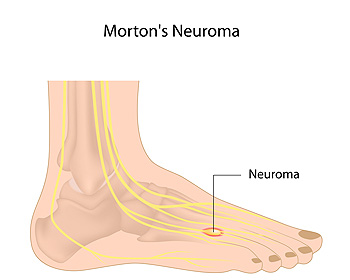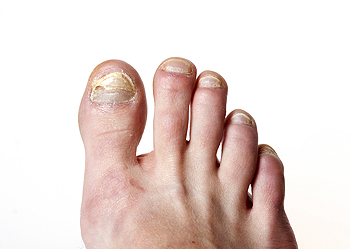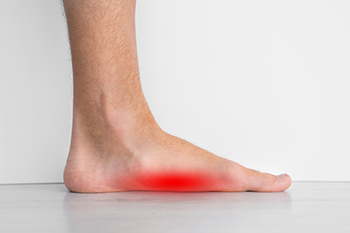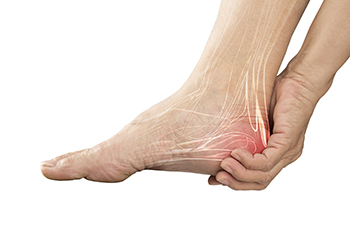Items filtered by date: February 2023
What Can Lead To Morton’s Neuroma?

There are nerves in the foot referred to as plantar digital nerves. The foot condition known as Morton’s neuroma affects the nerves that run between the third and fourth toes. This nerve can become compressed from wearing shoes that are tight in the toe area, for example, high heels. Foot deformities such as bunions and hammertoes may also lead to the development of Morton's neuroma. This condition may also occur if there has been a foot or nerve injury, weakness in the foot muscles, or from standing for extended periods. Relief may be found when the pressure that affected the nerve is ceased. This can be accomplished by wearing flat shoes, shoes with a low heel, or cushioned insoles. In severe cases, to eliminate the pain, surgery may be necessary to remove the nerve. If you have Morton’s neuroma, it is strongly suggested that you seek the counsel of a podiatrist who can determine what the best type of treatment is for you.
Morton’s neuroma is a very uncomfortable condition to live with. If you think you have Morton’s neuroma, contact Harvey Jacobs, DPM of Quality Foot Care Center. Our doctor will attend to all of your foot care needs and answer any of your related questions.
Morton’s Neuroma
Morton's neuroma is a painful foot condition that commonly affects the areas between the second and third or third and fourth toe, although other areas of the foot are also susceptible. Morton’s neuroma is caused by an inflamed nerve in the foot that is being squeezed and aggravated by surrounding bones.
What Increases the Chances of Having Morton’s Neuroma?
- Ill-fitting high heels or shoes that add pressure to the toe or foot
- Jogging, running or any sport that involves constant impact to the foot
- Flat feet, bunions, and any other foot deformities
Morton’s neuroma is a very treatable condition. Orthotics and shoe inserts can often be used to alleviate the pain on the forefront of the feet. In more severe cases, corticosteroids can also be prescribed. In order to figure out the best treatment for your neuroma, it’s recommended to seek the care of a podiatrist who can diagnose your condition and provide different treatment options.
If you have any questions, please feel free to contact our office located in Somerset, NJ . We offer the newest diagnostic and treatment technologies for all your foot care needs.
Treatments for Toenail Fungus

Toenail fungus is a fungal infection of the foot that negatively impacts the texture of the nail. Importantly, there are a variety of different kinds of treatments that are available to treat a case of toenail fungus. After visiting a trusted medical professional such as a podiatrist, a patient might be informed that they can benefit from a cream, solution, medicated nail polish, or some other kind of treatment. The severity of the toenail fungus might affect the treatment that is recommended. Creams meant to address a toenail fungus are of particular significance because some can be used to treat a fungus all over the body. However, some creams of this kind are only meant to treat relatively mild infections. It is important to fully understand the specific pros and cons of whatever fungal cream you select. Schedule an appointment with a podiatrist today who can help you select the best treatment for your toenail fungus.
For more information about treatment, contact Harvey Jacobs, DPM of Quality Foot Care Center. Our doctor can provide the care you need to keep you pain-free and on your feet.
Toenail Fungus Treatment
Toenail fungus is a condition that affects many people and can be especially hard to get rid of. Fortunately, there are several methods to go about treating and avoiding it.
Antifungals & Deterrence
Oral antifungal medicine has been shown to be effective in many cases. It is important to consult with a podiatrist to determine the proper regiment for you, or potentially explore other options.
Applying foot powder on the feet and shoes helps keep the feet free of moisture and sweat.
Sandals or open toed shoes – Wearing these will allow air movement and help keep feet dry. They also expose your feet to light, which fungus cannot tolerate. Socks with moisture wicking material also help as well.
If you have any questions please feel free to contact our office located in Somerset, NJ . We offer the newest diagnostic tools and technology to treat your foot and ankle needs.
Heel Pain Can Be Treated!
Stretching Flat Feet

Rigid flat feet are evident by the lack of arch while standing. Some people can see an arch when they’re sitting down which is referred to as flexible flat feet. Both conditions may cause the feet to feel achy, and there are specific stretches that may help to alleviate this. There are small muscles inside the foot that can improve the foot arch, and the short foot exercise may help to strengthen these muscles. This is done by keeping the foot on the floor while sitting in a chair, and sliding the front of the foot along the floor toward the heel. This is most effective when repeated up to ten times and after holding for several seconds. The calf stretch is a popular exercise to perform that may help to strengthen flat feet. This is done by standing against a wall, and extending one leg back until a gentle stretch is felt. If you would like more information about how to improve flat feet, please ask a podiatrist who can provide you with additional stretching techniques.
Flatfoot is a condition many people suffer from. If you have flat feet, contact Harvey Jacobs, DPM from Quality Foot Care Center. Our doctor will treat your foot and ankle needs.
What Are Flat Feet?
Flatfoot is a condition in which the arch of the foot is depressed and the sole of the foot is almost completely in contact with the ground. About 20-30% of the population generally has flat feet because their arches never formed during growth.
Conditions & Problems:
Having flat feet makes it difficult to run or walk because of the stress placed on the ankles.
Alignment – The general alignment of your legs can be disrupted, because the ankles move inward which can cause major discomfort.
Knees – If you have complications with your knees, flat feet can be a contributor to arthritis in that area.
Symptoms
- Pain around the heel or arch area
- Trouble standing on the tip toe
- Swelling around the inside of the ankle
- Flat look to one or both feet
- Having your shoes feel uneven when worn
Treatment
If you are experiencing pain and stress on the foot you may weaken the posterior tibial tendon, which runs around the inside of the ankle.
If you have any questions please feel free to contact our office located in Somerset, NJ . We offer the newest diagnostic and treatment technologies for all your foot and ankle needs.
Heel Pain Can Happen for Different Reasons

The heel is unique. It is a cushion of fatty tissue that maintains its shape despite the pressure that is endured daily. Heel pain can occur from wearing shoes that do not fit correctly or standing on hard surfaces for most of the day. Obesity may cause the heels to hurt and may be diminished when additional weight is shed. Some people are born with abnormal foot structures, and this may lead to chronic heel pain. Plantar fasciitis is a common condition of the heel that can cause pain and discomfort. A podiatrist can prescribe custom-made orthotics, which may help to provide relief, and surgery may be necessary for more severe cases. Children who participate in sporting activities may be prone to developing Sever’s disease. This condition affects the heels of children and young teenagers during growth spurts. If you have heel pain for any reason, it is strongly advised that you seek help from a podiatrist who can determine the cause and offer treatment options that are correct for you.
Many people suffer from bouts of heel pain. For more information, contact Harvey Jacobs, DPM of Quality Foot Care Center. Our doctor can provide the care you need to keep you pain-free and on your feet.
Causes of Heel Pain
Heel pain is often associated with plantar fasciitis. The plantar fascia is a band of tissues that extends along the bottom of the foot. A rip or tear in this ligament can cause inflammation of the tissue.
Achilles tendonitis is another cause of heel pain. Inflammation of the Achilles tendon will cause pain from fractures and muscle tearing. Lack of flexibility is also another symptom.
Heel spurs are another cause of pain. When the tissues of the plantar fascia undergo a great deal of stress, it can lead to ligament separation from the heel bone, causing heel spurs.
Why Might Heel Pain Occur?
- Wearing ill-fitting shoes
- Wearing non-supportive shoes
- Weight change
- Excessive running
Treatments
Heel pain should be treated as soon as possible for immediate results. Keeping your feet in a stress-free environment will help. If you suffer from Achilles tendonitis or plantar fasciitis, applying ice will reduce the swelling. Stretching before an exercise like running will help the muscles. Using all these tips will help make heel pain a condition of the past.
If you have any questions please contact our office located in Somerset, NJ . We offer the newest diagnostic and treatment technologies for all your foot and ankle needs.

